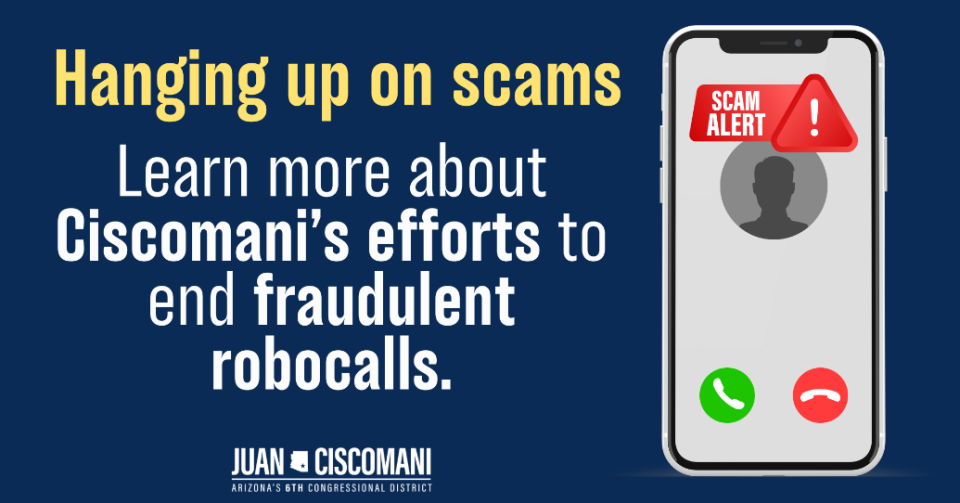Ciscomani, Sorensen Lead Effort to Crack Down on Artificial Intelligence Robocalls
February 6, 2025
‘This critical legislation to require robocallers to disclose the use of AI, cut down on fraudulent calls, and protect Americans from malicious scams like these’
WASHINGTON, D.C. - U.S. Congressman Juan Ciscomani (AZ-06) joined Rep. Eric Sorensen (IL-17) in a bipartisan bill to crack down on robocalls and increase penalties for anyone who uses artificial intelligence (AI) to impersonate individuals.
Image

Specifically, the Quashing Unwanted and Interruptive Electronic Telecommunications (QUIET) Act (H.R. 1027) would require robocallers to disclose when AI technology is being utilized and increase penalties for anyone who uses AI to impersonate individuals or entities with the intent to defraud, cause harm, or obtain anything of value. This bill builds on the Telephone Robocall Abuse Criminal Enforcement and Deterrence (TRACED) Act, which was signed into law in 2019.
"The advancement of technology combined with the integration of artificial intelligence (AI) have transformed robocalls from an occasional nuisance into a powerful tool used by scammers and other bad actors to defraud Arizonans out of their hard-earned money," said Ciscomani. "I know my constituents are fed up, which is why I am proud to partner with Rep. Sorensen on this critical legislation to require robocallers to disclose the use of AI, cut down on fraudulent calls, and protect Americans from malicious scams like these.”
Randy Graf, president and CEO of the Green Valley/Sahuarita Chamber of Commerce, praised the introduction of the QUIET Act as a tool that will help protect people from scams.
“Older adults in communities like Green Valley are often the target of robocall scams,” said Graf. “I am grateful that Congressmen Ciscomani and Sorensen are fighting to protect them. The QUIET Act is a necessary and proactive step in the right direction.
"Illinoisans are already stretched thin with high costs making every dollar count,” said Sorensen. “The last thing our seniors and working families need is to be bombarded with attacks from scam callers using new technologies to impersonate their loved ones, their bank, or the government. This bill puts real penalties in place to stop scammers from using AI and reduces the frustrating scam calls that unfairly target seniors and vulnerable communities.”
The QUIET Act was endorsed by the AARP:
"Often, the first way an individual engages with a scam is via a phone call, text, or email," said Bill Sweeney, Senior Vice President, Government Affairs. "With AI’s growing ability to convincingly mimic voices and craft deceptive messages, the stakes have never been higher. The QUIET Act can help combat these deceptive tactics by requiring robocallers to disclose when they use AI technology and increasing penalties for those who use AI to impersonate individuals or organizations with the intent to defraud, cause harm, or wrongfully obtain anything of value."
Read the full bill text here.
###